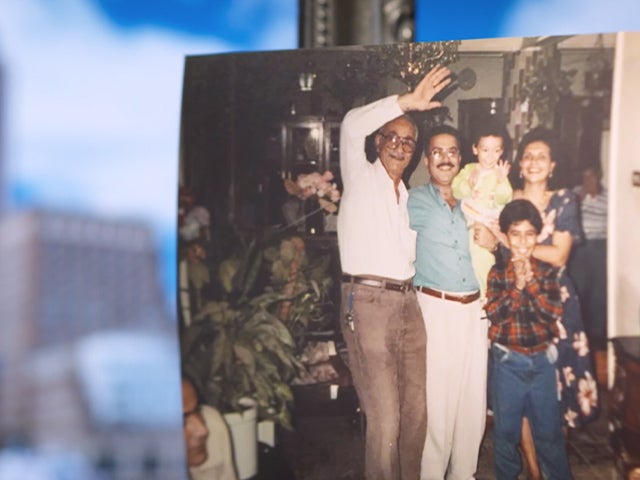Finding Freedom in America and God
Boston, MA
“I was the first one to get it from the mailman,” says Fady Ghobrial. “I ran up our entire apartment building screaming and hollering, and everybody knew.”
12-year-old Fady Ghobrial’s dreams were about to come true. His dad, a chef in Cairo, Egypt, got a job in Boston. The family was moving to America.
“We idolized almost or daydreamed about this idea of coming to America—the land of freedom, of opportunity, a better education, a better future,” says Fady.
However, those hopes, and dreams didn’t come out the way Fady pictured. He and his family arrived a year after 9/11.
“Kids would say stuff like, ‘Hey, are you Osama bin Laden’s cousin?’ or ‘Saddam Hussein’s cousin?’" says Fady. “So, I was buried under all of the verbal harassment as well as the physical bullying as well. There was rejection, feeling like an outsider.”
Fady says the legalistic Christian faith he grew up in often made him feel the same way.
“There was the-the shame piece that was reinforced at home and at church,” says Fady. “I need to be good enough for God to love and accept me, and that depended purely on my works and-and my good performance, which I could never do enough of.”
“The part of it that wore me out the most, was feeling powerless against my own sin. I sin Monday through Saturday. I go to the priest on Sunday, I confess my sin, rinse, wash, repeat the same cycle,” says Fady. “So, I’m in a permanent state of inability to please God. Why am I even here?”
By his teen years, Fady had drawn one conclusion.
“God is ticked at me. God is angry at me. God doesn’t like me,” says Fady.
“I’m not enjoying anything. Everything is-is difficult, everything is challenging. Uh, I want to escape that and go to a place where I’m not being bullied, where I am having fun, where I am enjoying myself,” says Fady.
In high school, Fady found friendship in a group of classmates. While it marked the end of the bullying, it also led him to smoking pot, drinking and sleeping around. He also started buying into the beliefs of some in the group who were atheists and telling himself he could live a life free of guilt and shame.
“I would have said like, ‘I don’t believe that God exists.’ And maybe underneath that, in a more honest moment, I would have said, ‘I don’t want to believe that God exists,’” says Fady. “I like what I’m doing, and I don’t want God to tell me to do otherwise.”
Instead of finding freedom and happiness...
“It was just this downward spiral, ‘I’m awake, I’m aware, I feel futility and purposelessness,” says Fady. “Let me go back to the drugs in order to numb that feeling. This underlying restlessness, right? Where I just don’t have peace.”
The teenager fought with his parents often. To keep the peace, Fady would go to church on occasion. He was still living at home his freshman year of college, when a family they knew invited them to visit their church. Fady says it was much different from what he was used to.
“The people there were genuine, sincere, they were loving,” says Fady. “Really free, full of joy, full of peace who loved Jesus.”
Also different was the teaching about a loving God ready to forgive all sins through Jesus Christ, a message that would lead Fady’s parents and brother to fully commit their lives to Jesus.
“The fights and the tone and the anger at home was completely changed,” says Fady. “My mom had a lot more peace.”
As for Fady, he continued drinking, smoking pot, and partying, unable to accept God’s message of redemption that had changed those around him.
“The resistance was, ‘I can’t believe that God would ever forgive me for all of the terrible, wicked, horrible things that I’ve done,” says Fady.
Then the summer after Fady’s freshman year, his dad insisted he go with the family to a church conference on the 4th of July weekend. Reluctantly, Fady went. But as he listened to the speakers, God’s message of love and forgiveness finally broke through.
“I’m hearing about the cross and the fact that Jesus died for my sin in order to forgive me and to cleanse me. And to give me a new life and to reconcile me with God,” says Fady. “And I felt like God just cornered me with His love and just embraced me in His arms and said, ‘Hey, Son, I love you. I’ve forgiven you of all your sin and I’m giving you my Spirit.’ And that was—that was my moment, that was my moment of surrendering my life to Christ,” says Fady.
Fady made a clean break from his lifestyle, losing all desire for drugs and alcohol as he discovered his new identity in Christ.
“The way that I think about myself anymore is not this horrible, terrible, wicked, no-good sinner that God hates and despises,” says Fady. “That was me, but because of the Gospel and because of my position now being in Christ, God looks at me and He’s very well-pleased. God looks at me and He sees Jesus,” says Fady. “And that conception of who I am before the sight of God changes everything.”
After college, Fady married Renée and became a pastor at the Arabic Baptist Church in Boston. Every 4th of July, he celebrates his own personal Independence Day.
“Independence from sin and death and hell and the grave, because we’ve been united to Christ,” says Fady. “So, the symbolism there is not lost on me! God met me and-and completely transformed me and renewed me by His grace. Which, you know, I wasn’t there looking for God. But, hey, God was there looking for me,” says Fady.





